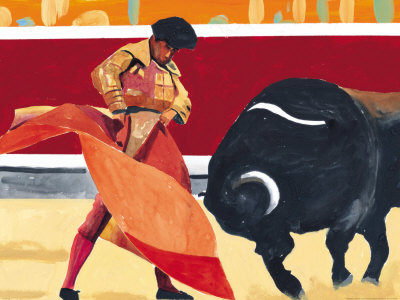That's right. We're going for a whole opera - that's how well-known Carmen is. It's so well-known that people sometimes even know the name of the opera itself. Besides which, most operas contain one really well-known piece; this one has three. All in all, not bad for a composer who barely made it to 36 and never really saw success in his own lifetime.
 |
| Bizet at 11 - the beard was added posthumously. |
His first full opera, Les pêcheurs de perles (The Pearl Fishers) was premiered in 1863 to middling-to-unfavorable reviews - though a tenor/baritone duet, "Au fond du temple saint" is part of the vocal repertoire for many budding singers. Carmen itself premiered in 1875, and though its first run had over forty performances, Bizet did not live to see all of them. At age 36, he died from heart failure, disappointed at the cool reception (despite the long performance run) of Carmen. Performances of Carmen ceased almost immediately after Bizet's death, but only five years later, the opera was revived in Paris and has not left either the opera repertory or the public consciousness since.
 |
| Just in case anyone was worried, that last caption was a lie. |
But yes. Back to Carmen.
It was commissioned in 1873, and two years and many, many disputes later (one of the producers wanted Bizet to change the tragic ending to a happy one - a request Bizet flatly refused to accomodate), was premiered. Musically, this opera is important because up until that point, there were essentially two kinds of opera - opera comique and serious opera (not to be confused, of course, with opera seria - but that is another day). Carmen managed to marry the two forms together to create an art form that is not bereft of humor, but also manages to convey great emotional weight.
In the opera, there are three extraordinarily well-known melodies. The first of these is "L'amour est un oiseau rebelle," more commonly known as the Habañera (as sung by our friend the Sesame Street Orange in the first video). In Carmen, the piece is sung by Carmen herself, a sassy, saucy cigarette factory worker. The lyrics of the piece, sung after a great gaggle of men all ask her when she will love them, state that love is a rebellious bird, and that it knows no laws.
 |
| For those not clear on the Toreador lifestyle. |
Third, and finally, the beginning of the overture. This music is most often found in commercials (though oddly enough, I haven't heard it on television for a while). This music is from act 4, during which the characters are all preparing for an impending bull fight.
So there we have it, folks. Not one, not two, but three melodies that show up in places as diverse as Meet the Parents, Babe, and The Hudsucker Proxy. If only Bizet could've known that his music would be one day as loved and well-known as any classical music can be.
Further Listening:
Like Bizet, and men singing? Try "Au fond du temple saint," from Les pêcheurs de perles: http://www.youtube.com/watch?v=4tLrPVkfCIQ
Like French opera from the the 19th century? Try "Les oiseaux..." from Les contes d'Hoffman, by Jacques Offenbach: http://www.youtube.com/watch?v=e1k5l4oiCEc
And finally, a bonus video:
No comments:
Post a Comment